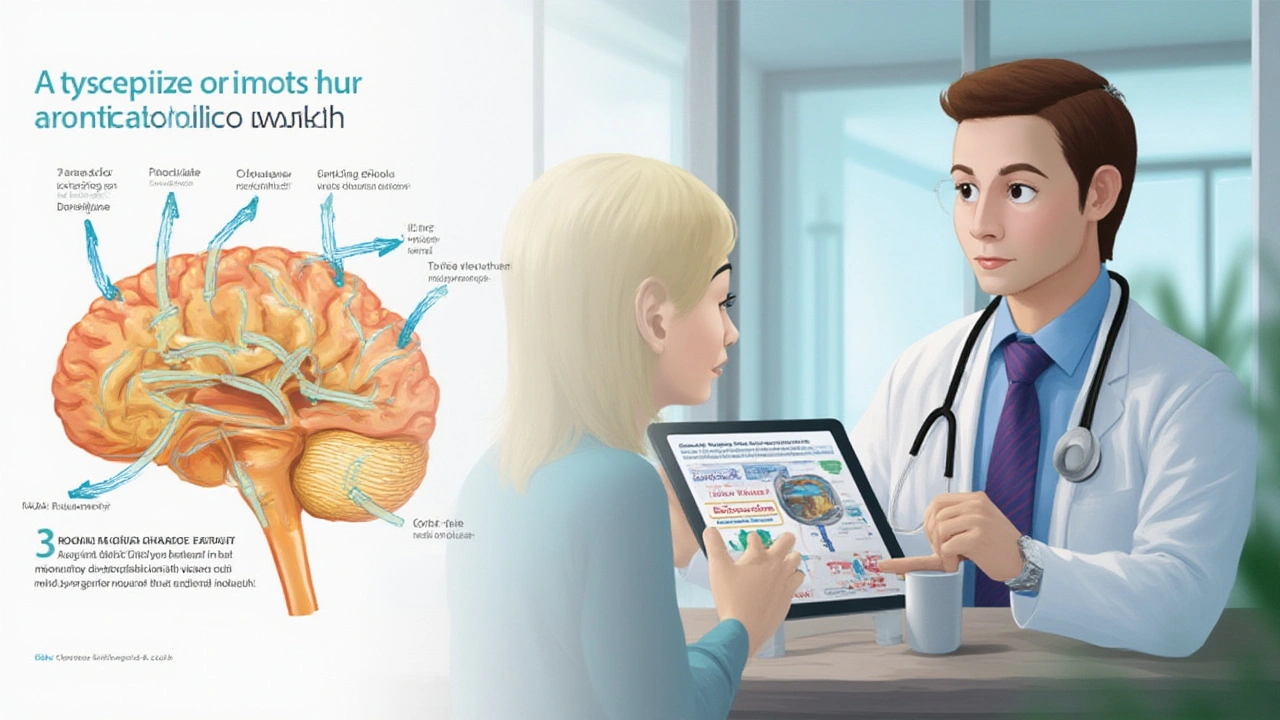Imagine walking into a pharmacy in Paris and seeing the word “Solian”. Not a vitamin, not a herbal remedy—this is amisulpride, a prescription medicine that quietly impacts thousands of lives. It’s rarely a first choice in headlines but sits on hospital shelves across Europe, dished out for people struggling with schizophrenia and other mental health curves. What’s strange? In the U.S., almost nobody talks about it. But in France, Italy, and parts of the UK, it’s an old friend with a slightly mysterious reputation.
What Is Solian and How Does It Work?
Solian is the brand name for amisulpride, an antipsychotic drug developed back in the 1990s. If you’re picturing a cartoonish tranquilizer, think again. This medicine belongs to a family called “atypical antipsychotics.” It shakes things up differently than older antipsychotics, mostly by targeting two specific dopamine receptors in the brain. Dopamine is a chemical messengers zipping around, managing everything from feeling pleasure to moving your body. In conditions like schizophrenia, those messengers don’t always play by the rules—either overactive or underactive in the wrong places. Solian tries to help restore that balance, especially when symptoms involve “hearing voices” or strong paranoid thoughts.
Unlike some antipsychotics that seem like a sledgehammer, Solian is more of a targeted tool. It’s surprisingly selective, which means it’s less likely to bring some of the dreaded “zombification” side effects. But it’s not a gentle vitamin supplement either. Doses can range from 50mg a day for mild symptoms to 1,200mg for more intense needs. Doctors fine-tune the dose, and like any mental health med, it can take weeks to feel real results. People often need patience, support, and a healthy dose of hope.
What makes Solian stand out? For one thing, it plays nicer with your weight and doesn’t ramp up hunger the way some other antipsychotics do. Folks report not having those crazy munchies or rapid weight gain that can come with meds like olanzapine. Not bad, right? But Solian has an odd Achilles’ heel—side effects that sneak in under the radar, affecting hormones. In some, especially younger patients or women, breast tenderness, missed periods, or even unexpected milk production have been flagged. It’s a weird, unsettling effect—nobody expects a mind medicine to affect hormones that way. That’s due to Solian’s effect on blocking dopamine in a place that manages prolactin, the tricky hormone behind these changes.
Doctors sometimes choose Solian for people who can’t handle weight gain or intense sedation, especially younger people trying to stay in school or work. But they watch for those hormonal changes, tracking things with lab tests now and again, especially after the first few months.
Solian isn’t sold in the United States. The FDA never approved it, mostly because similar meds—like risperidone and aripiprazole—crowded the market first, and companies didn’t see a big financial reason to push Solian through long, expensive approval. Yet European psychiatrists keep reaching for it, especially when older drugs cause too many problems. One psychiatrist in the UK said,
“Amisulpride is one of the few antipsychotics I keep as a secret weapon for tricky-to-treat schizophrenia. When other drugs fail or cause intolerable side effects, this often works quietly and steadily.”
It’s also showing up in studies about depression. When added to traditional antidepressants, low doses of Solian can sometimes help people who haven’t found relief, especially for “dysthymia,” which is like depression’s low-key, lingering cousin. There’s still a lot to be learned—Solian’s not approved for this use everywhere. But the early signs are promising.

Side Effects and Patient Experiences With Solian
Every medicine has a personality, and Solian’s is full of quirks. Most folks brace themselves for the usual antipsychotic troubles—weight ballooning up, feeling like a zombie, shaking hands, or sleeping for hours. With Solian, the picture is a bit more mixed. It rarely causes wild weight gain, which can be a huge relief if you’re wrestling schizophrenia and don’t fancy eating like a bear preparing for hibernation. People also report fewer problems with drooling or stiff muscles than with older meds.
Yet, Solian comes with a couple of surprises. By affecting dopamine in a place called the pituitary, it raises prolactin—a hormone responsible for breast milk production. That means men and women both can end up with sore boobs, missed periods, or even rare nipple discharge. It feels like a throwback to puberty, not something most people expect from a psych med. Some users share stories online of waking up to find milk spots on their shirts, or feeling weird pressure in their chest. It doesn’t happen to everyone, but enough that it’s become a warning on the official label.
There’s also the matter of sexual side effects. Lowered libido can set in, and men can experience erectile issues. Mind you, lots of other antipsychotics—risperidone, for example—do this too. It’s the price of tinkering with brain chemistry, but it’s still not a small deal for anyone hoping to keep a relationship going while managing mental illness.
One overlooked side effect is agitation. Some people, especially at lower doses, report feeling jumpy, restless, or unable to sit still. There’s no universal reason, but it might be related to how Solian gently tweaks dopamine, compared to the jolt from harsher medications. Talk to anyone on the drug, and you’ll hear a mix of reviews: “It was a miracle for my voices,” one student writes in a UK forum. “But my chest got so sore, I had to switch.” A French user, on a support site, claims: “I gained less weight, could work part-time, but the milk thing freaked me out. My doctor dropped the dose, and that helped.”
Doctors advise regular check-ins during the first months—blood pressure, pulse, hormone checks. It sounds like a lot, but catching side effects early can keep things manageable. If you’re a woman of childbearing age or a teenage boy (who can sometimes develop breast tissue), it’s worth raising hormonal worries before they become real problems.
Interactions with alcohol are another quirk. Many meds say “avoid booze,” but Solian interacts in unpredictable ways. For some, a single drink can seriously magnify sleepiness. For others, alcohol seems to “cancel out” the drug, with old symptoms making a sudden comeback. Play it safe and talk openly with your clinician about your usual habits—no shame, just facts.
Tips from real patients are often better than doctor lectures. A few tips that come up over and over:
- Take Solian at the same time each day, to keep your mood stable.
- If you miss a dose, don’t double up—just go back to your normal routine.
- Stay hydrated, especially if you get lightheaded. Drinking water helps smooth out small blood pressure drops.
- Track your periods if you’re a woman, and mention changes to your doctor—don’t chalk it up to stress.
- If you get stuck with intense restlessness or leg shaking, ask about lowering your dose. Sometimes that does the trick.
- Keep up with check-ups—yes, they’re a hassle, but small tweaks can prevent big problems.
Schizophrenia has highs and lows, relapses and recoveries. The truth is, Solian doesn’t work for everyone. But for some, it’s the tool that gently keeps their thoughts in line, without causing the sleepiness or wild hunger that makes daily life extra hard. Don’t expect instant results, and don’t go cold turkey if you want to stop. Withdrawal can hit hard, so always plan with a doctor.

Treatment Tips, Warnings, and The Future of Solian
If you’re on Solian or considering it, you’re probably eager for practical advice, not just science. Doctors usually recommend starting low and increasing the dose slowly—too quick, and side effects get bumpy. Blood tests (for prolactin and basic metabolism) are a must in the early months. If side effects show up, they often improve with dose tweaking, but don’t be shy about reporting weird physical changes, no matter how awkward.
Kidneys play a big role in clearing Solian, so if you have kidney issues, lower doses may be needed. The med isn’t recommended for folks with liver problems, and mixing it with other antipsychotics is risky unless a psychiatrist is steering the ship. Suddenly stopping can cause confusion, anxiety, or even a fast relapse, so always taper down slowly under watchful eyes.
Pregnancy brings a unique twist. Solian shouldn’t be used unless absolutely necessary, and women who might become pregnant need to use good birth control. Solian can sneak into breast milk, so nursing isn’t generally advised. For older adults, especially those with dementia, Solian has a higher risk of unexpected death; that’s true for all antipsychotics, but it’s a sobering warning for families weighing options.
On the topic of driving: until you know how Solian hits you, avoid the roads. Some patients feel drowsy, especially in the early weeks, while others are unaffected. It’s not the time to push your luck with heavy machinery or late-night road trips.
Here’s a lesser-known fact: Solian has been studied for use in bipolar disorder and major depression when standard treatments flop. Doses are much lower than for schizophrenia, and careful tracking is essential. There’s talk in research circles about even broader uses, but large studies are still ongoing. Solian also has a pretty low risk of diabetes or major cholesterol increases, which is reassuring for anyone with a family history of metabolic problems.
And what about stigma? People taking antipsychotics often feel judged, or even fear “looking crazy” in the pharmacy. Times are changing. More health campaigns focus on recovery and resilience, and sharing stories—both positive and negative—helps erode old prejudices. One patient support leader states,
“We need real conversations about these medications—not shame or fear. Solian works well for many, and there’s nothing weak or broken about needing help,”and it’s a truth worth remembering.
So if you or someone you love is considering Solian, keep this in mind: no med is perfect, but Solian has quietly helped thousands find steadier ground. Ask questions, stay alert to body signals, and don’t carry the journey alone. Medication is just one tool—paired with therapy, routines, and purpose, it can help people reclaim their days from the confusion of mental illness.

This is why American pharma is broken. They don't care about efficacy, only market share. If this drug works better for a subset of patients and avoids weight gain, why isn't it here? Because the ROI on marketing it to depressed, skinny white kids isn't high enough. Profit over people. Again.
The pharmacokinetic profile of amisulpride demonstrates a high selectivity for D2 and D3 dopamine receptors, particularly in the limbic system, which may account for its reduced extrapyramidal symptomatology relative to first-generation antipsychotics. However, its prolactin-elevating properties remain a clinically significant concern requiring longitudinal monitoring.
So americans dont know about this because they dont know how to do medicine properly huh funny how the french have been quietly fixing schizophrenia for decades while we're still debating whether antidepressants are real also prolactin side effects are wild my cousin got milk from her nipples on 100mg she said it felt like her body was betraying her not the worst tradeoff though
It's important to remember that medication is just one part of recovery. Solian may help stabilize symptoms, but therapy, routine, and community support are what truly rebuild lives. For those struggling, you're not alone. Progress isn't linear, but it's possible. Keep showing up-even on the days the medicine feels like a burden.
i read this whole thing and now i think solian is like the quiet kid in class who doesnt talk much but gets straight a’s and then somehow starts lactating?? also why is this even a thing in europe but not here? did someone at the fda just yawn and say 'nah'
this is why we need to ban all foreign meds usa makes the best drugs why are we letting europe tell us what to take also prolactin?? that sounds like a vampire spell i dont trust this
I just want to say-thank you for writing this. So many people feel invisible when they’re on meds like this. I’ve been on amisulpride for 3 years. The milk thing scared me at first too. But I’m working. I’m sleeping. I’m not hearing voices every morning. That’s worth the weird side effects. You’re not broken. You’re healing.
I just wanted to add-please, please, please if you’re starting Solian, keep a journal. Not just for mood, but for physical changes too. I wrote down every weird thing: ‘Day 12: chest pressure, no milk yet.’ ‘Day 23: period skipped, no pregnancy test.’ ‘Day 30: milk spots on shirt, called doctor immediately.’ It sounds silly, but it helped my psychiatrist adjust my dose before things got worse. You’re not overreacting. Your body is talking. Listen.
Of course the French have better psychiatry. They drink wine, smoke Gauloises, and have existential crises with style. Meanwhile, Americans are just popping pills like candy while binge-watching TikTok. Honestly, this drug is just a Band-Aid on a bullet wound. You’re not ‘recovering’-you’re chemically sedated. At least admit that.
The pharmacodynamic selectivity of amisulpride for mesolimbic D2/D3 receptors is well-documented, yet the clinical literature on its efficacy in treatment-resistant depression remains methodologically flawed. Most studies lack adequate blinding, and prolactin elevation is often underreported as a confounder. This article reads like a marketing pamphlet disguised as medical journalism.
America is the greatest country in the world and we don't need some European drug to tell us how to treat our people. We have Zyprexa, Seroquel, Abilify-real American medicine. This Solian nonsense is just another way for the globalists to undermine our healthcare sovereignty. Also, milk from nipples? That's unnatural. This should be banned.
In India, we have no access to such medications. Our psychiatrists prescribe haloperidol and chlorpromazine. The side effects are brutal. But we are grateful for any relief. I wonder if this drug is available in generic form? If yes, perhaps it can be imported through compassionate use programs. The suffering here is silent, but it is real.
Prolactin elevation is a class effect of D2 antagonism. Amisulpride’s high affinity for presynaptic autoreceptors at low doses may explain its antidepressant properties. However, the risk-benefit ratio must be evaluated on an individual basis. Monitoring serum prolactin and liver enzymes is standard of care. No surprises here.
I’m just here to say that if you’re taking this and you’re a woman, you’re basically a lab rat for Big Pharma. They don’t care that you’re lactating. They care about the stock price. Also, why is no one talking about how this drug makes you emotionally numb? Like, you stop feeling anything. Not even anger. That’s not healing. That’s erasure.
i think this is kind of wild honestly like i get why its not in the usa but also… why does it work so well for some people and why does it make you lactate?? i mean… i dont even know what to feel about that also i think the guy who said ‘quietly helped thousands’ is right sometimes the quietest drugs are the ones that save you
I’m a nurse in Chicago. I’ve seen patients on Solian. One woman, 28, single mom, had been in and out of hospitals for 8 years. On olanzapine-gained 80 pounds, couldn’t work. Switched to Solian. Lost 30, got a job at the library. Started painting again. Then, she started leaking milk. She cried in my office. Said, ‘I didn’t know my body could do this while I was trying to stay sane.’ We lowered her dose. She still gets milk sometimes. But she’s alive. She’s raising her kid. And she says: ‘It’s not perfect. But it’s mine.’ That’s the story no one writes about. This isn’t just a drug. It’s someone’s quiet victory.
That nurse comment… that’s the one that hits. I had a friend on this. She said the milk was the weirdest part. Like, your body remembers being a mother even when you’re not. It’s not just a side effect. It’s a ghost. And somehow, she kept going. That’s the real story.